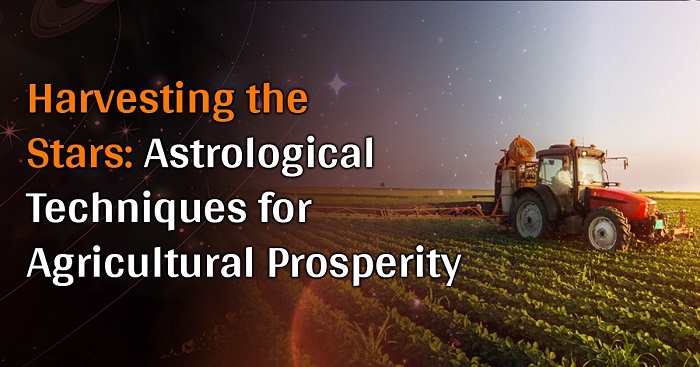Welcome to the fascinating world where ancient wisdom meets modern farming techniques: Top Astrological Practices for Agricultural Success. This guide will explore how aligning agricultural activities with celestial movements can significantly impact harvests and crop yields.
Astrology, often seen as a tool for predicting personal destinies, also holds valuable insights for those working the land. By understanding the influence of celestial bodies like the sun, moon, and planets on Earth’s cycles, farmers can optimize planting, cultivation, and harvesting timings to enhance agricultural productivity.
Through centuries of observation and experimentation, astrologers have developed a repertoire of remedies and practices tailored to agricultural needs. These practices range from planting and pruning according to lunar phases to timing irrigation and pest control based on planetary alignments.
Harnessing these astrological remedies doesn’t require complex rituals or esoteric knowledge. Instead, it recognizes natural patterns and synchronizes farm activities with cosmic rhythms. By integrating these age-old practices with modern farming methods, farmers can unlock the full potential of their land and achieve greater abundance in their harvests and crop yields.
How Astrology and Agricultural Practices are Interconnected?
●Seasonal Timing: Astrology provides insights into seasonal timing, helping farmers anticipate weather patterns and adapt their farming practices accordingly. Aligning planting and harvesting schedules with astrological forecasts can mitigate risks and maximize agricultural output.
●Remedial Measures: Astrology offers remedial measures, such as rituals, prayers, and offerings, to mitigate negative astrological influences on agricultural activities. These remedies aim to appease planetary energies and promote harmony in the natural world.
●Traditional Wisdom: Many agricultural communities have inherited astrological practices passed down through generations. This traditional wisdom integrates celestial observations with empirical knowledge of local ecosystems, enhancing agricultural sustainability and resilience.
●Holistic Approach: By integrating astrology with agricultural practices, farmers adopt a holistic approach that acknowledges the interconnectedness of cosmic, terrestrial, and biological systems. This holistic perspective fosters a deeper understanding of nature’s rhythms and cultivates harmony between humans and the environment.
●Celestial Influence: Astrology acknowledges the influence of celestial bodies such as the sun, moon, and planets on Earth’s energy and rhythms. Farmers observe these celestial movements to determine auspicious times for planting, cultivating, and harvesting crops.
●Lunar Phases: Farmers utilize the lunar phases, such as the waxing and waning of the moon, to plan their agricultural activities. For example, planting crops during a waxing moon promotes growth, while pruning during a waning moon may enhance root development.
●Planetary Alignments: Certain planetary alignments are thought to influence specific aspects of agricultural production. For instance, aligning planting activities with the position of Jupiter, which is associated with abundance and expansion, is believed to enhance crop yields.
Top Astrological Practices for Agricultural Success
1. Lunar Planting:
Explanation: Lunar planting involves aligning planting activities with the moon’s phases. Planting during the waxing moon promotes above-ground growth while planting during the waning moon is thought to enhance root development.
Benefit: Farmers can optimize crop growth and yield potential by synchronizing planting with lunar phases.
2. Planetary Alignment:
Explanation: Farmers consider the positions of planets, such as Jupiter and Saturn, to determine auspicious times for agricultural activities. Aligning planting, cultivating, and harvesting with favorable planetary positions is believed to enhance agricultural success.
Benefit: Harnessing planetary alignments can improve crop quality, yield, and resilience to environmental stressors.
3. Astrological Forecasting:
Explanation: Farmers consult astrological forecasts to anticipate weather patterns, pest outbreaks, and other agricultural challenges. Farmers can make informed decisions about crop management strategies by integrating astrological insights with meteorological data.
Benefit: Astrological forecasting enables proactive risk management and adaptation to changing environmental conditions, leading to more reliable harvests.
4. Astrological Remedies:
Explanation: In the face of adverse astrological influences, farmers employ remedial measures such as rituals, prayers, and offerings to mitigate potential crop harm. These remedies aim to harmonize cosmic energies and promote agricultural prosperity.
Benefit: Astrological remedies serve as spiritual insurance, fostering a sense of control over factors beyond human influence and promoting psychological resilience in the face of agricultural challenges.
5. Seasonal Timing:
Explanation: Astrology provides insights into seasonal timing, helping farmers determine optimal periods for planting, cultivating, and harvesting crops. By aligning agricultural activities with astrological rhythms, farmers can maximize crop yield and quality.
Benefit: Seasonal timing enhances farm efficiency, reduces resource wastage, and fosters a deeper connection with natural cycles, promoting sustainable agricultural practices.
Integrating top astrological practices into agricultural endeavors offers a holistic approach to farm management, blending ancient wisdom with modern techniques. Drawing from the rich tradition of Vedic astrology, farmers harness celestial insights to optimize crop cultivation, timing, and resilience. Agriculturalists gain a strategic advantage in farm management by aligning planting schedules with lunar phases, leveraging planetary alignments, and utilizing astrological forecasting.
Moreover, applying astrological remedies provides a sense of empowerment and resilience in the face of environmental uncertainties. Embracing seasonal timing based on astrological principles fosters sustainable farming practices and a deeper connection with natural cycles. Through the synergy of Vedic astrology and farm management, agricultural success becomes not only achievable but also harmonious, reflecting a profound understanding of the intricate relationship between the cosmos and the cultivation of the land

